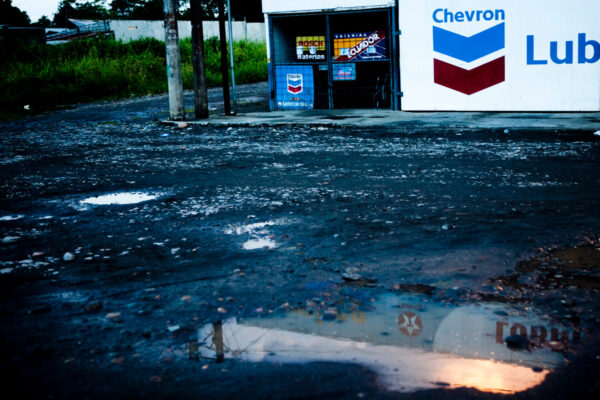Just when supporters of a controversial pipeline that would double Ecuador’s oil output – and royalties – were gaining confidence that construction on the project would soon begin, a new wave of resistance in the courts and on the ground is chastening expectations.
The Ecuadoran government gave final approval for the pipeline in June (see the 6/13 Greenwire), and construction was scheduled to begin this month. But a series of lawsuits alleging that the government failed to adhere to consultation requirements during the approval process could put the project in limbo. Although Ecuador’s Constitutional Tribunal, a branch of the country’s Supreme Court, denied an effort by environmental and indigenous groups to secure an injunction to halt the project, two other suits are pending.
And tensions over the $1.1 billion pipeline, which would carry crude from Lago Agrio in the Ecuadoran Amazon across the cloud forests of the Andes mountains near Quito to the port of Balao, in the province of Esmeraldas, are also beginning to erupt on the ground. Yesterday, a group of ecologists, students and citizen activists occupied the offices of local officials in Quito, the Ecuadoran capitol, urging them to deny the right-of-way for the pipeline, according to Amazon Watch. The line would pass just north of the city, through the Mindo Nambillo Cloudforest Reserve.
According to the Committee for the Route of Least Impact, the project “would destroy unique habitat that harbors over 450 species of birds (5 percent of the world’s total), imperil a host of endangered plants and animals and undermine the livelihoods of local residents dependent on ecotourism.”
Critics were pushing for an alternative, southern route that would have followed Ecuador’s sole existing pipeline most of the way instead of clearing a new path.
Almost more important than the route, though, is the impact Ecuador’s newly expanded capacity will have on oil development in the Ecuadoran Amazon, environmental and indigenous groups say. Amazon Watch, Rainforest Action Network, CONAIE and other groups fear that a doubling in export capacity is likely to portend a new boom in oil production. “We’re looking at a new round of auctions, and many blocks up for auction are in pristine ecosystems,” including Yasuni National Park and the Cuyabeno Wildlife Reserve, says Elise Hogue, director of the Rainforest Action Network’s ECOnomics campaign. And expanded oil exploration is likely to encroach upon the ancestral lands of native groups such as Achuar, Huaorani and Quichua, some of which have vowed to never allow oil production in their territory, according to Amazon Watch Campaign Coordinator Kevin Koenig. (Although indigenous communities own the lands, the Ecuadoran government retains subsurface rights to them.)
“The OCP pipeline is merely the precursor to an enormous amount of destruction that will happen at drilling sites all over Ecuador,” Hogue predicts. The consortium that plans to build the pipeline is primarily comprised of companies that already do business in Ecuador.
The consortium consists of Canada’s Alberta Energy Co. Ltd., Agip Petroleum, U.S.-based Kerr-McGee Corp. and Occidental Petroleum Corp, Spain’s Repsol-YPF and Argentina’s Perez Companc and Techint, a construction firm. The pipeline will allow the companies to get “stranded oil” from field to market, the companies say. The new capacity is also likely to encourage new exploration, says Diego Ramirez, an economist at the Ecuadoran Embassy in Washington, DC.
For instance, Occidental’s decision to join Canada’s Alberta Energy Company (AEC) in planning to develop a new oil field in Block 15 was predicated on its expectations that the pipeline, which will be built by a consortium both companies are a part of, will go forward, Petroleum Intelligence Weekly, an international oil industry trade publication, reported in July.
Ramirez says he expects production in currently active areas to increase, although “you don’t know how much you have until you start pumping it out,” he says. Several new exploration blocks are scheduled to be auctioned off shortly, Ramirez says.
But any attempt to expand drilling operations is likely to meet fierce resistance from environmentalists and indigenous groups who oppose additional drilling in the Ecuadoran Amazon, particularly in blocks that overlap indigenous territories and protected areas, including Yasuni National Park and the Cuyabeno Reserve.
“On all levels, the OCP is examplary of the egregious way big oil tramples on the fragile ecosystems and the rights of its inhabitants,” says Koenig. “We have yet to see an example of responsible oil exploitation in the Ecuadorian Amazon.”
The Ecuadoran government strongly supports the project, which it says is important for economic growth. Oil exports are the country’s primary source of income, and the new pipeline will increase export capacity from about 400,000 barrels per day (bpd) to over 800,000 bpd, according to Juan Escalante, commercial attaché at the Ecuadoran Embassy in Washington, D.C. Like current oil exports, most of the new supplies will go to the United States – particularly California, according to Ramirez.
Koenig doubts that the new pipeline will put Ecuador in the black. After 30 years of oil production, the country’s external debt has risen from $230 million to $17 billion, he says. “Has oil helped the country, or hurt it?” he asks. The end result of three decades of oil production, he says, is that the country “has become trapped in a downward spiral of debt and dependency.”
The main destination for much of the new supplies – the United States – is likely to benefit from the project, Ramirez says. Although even a doubling of output from Ecuador, which ranks eighth on the U.S.’s list of top foreign suppliers, “won’t send shock waves anywhere,” the new pipeline “will help the US increase its reliance on hemispheric oil,” Ramirez says. Some analysts say the pipeline – and the increased output it will allow – will help grease the wheels of a shift already in motion that increases U.S. reliance on oil sources in Latin America and decreases dependence on Middle Eastern supplies.













